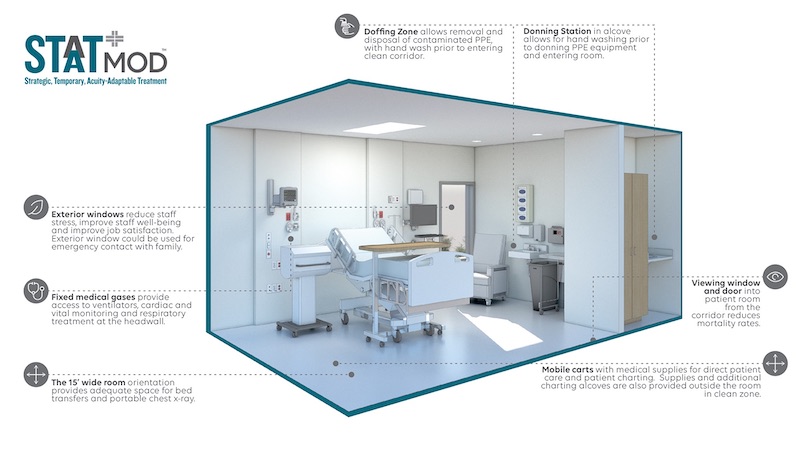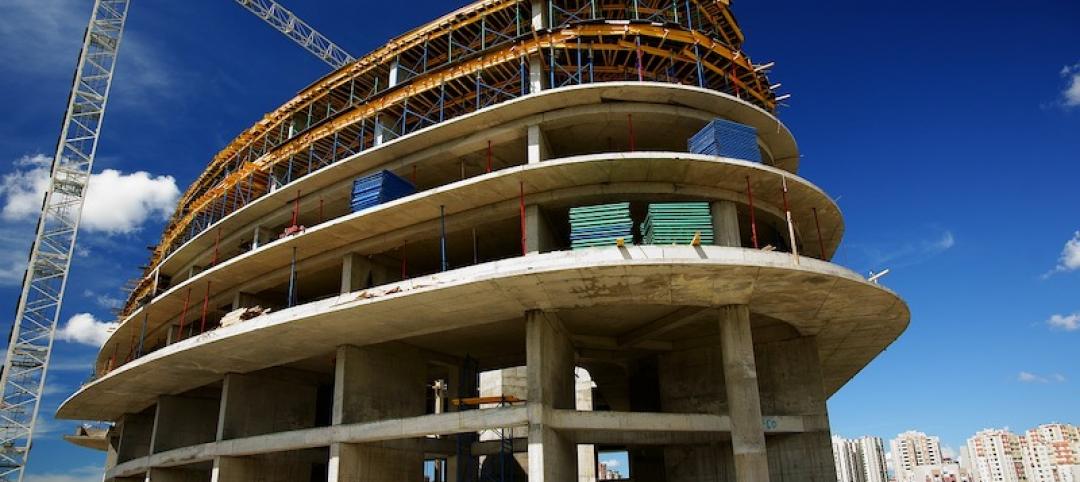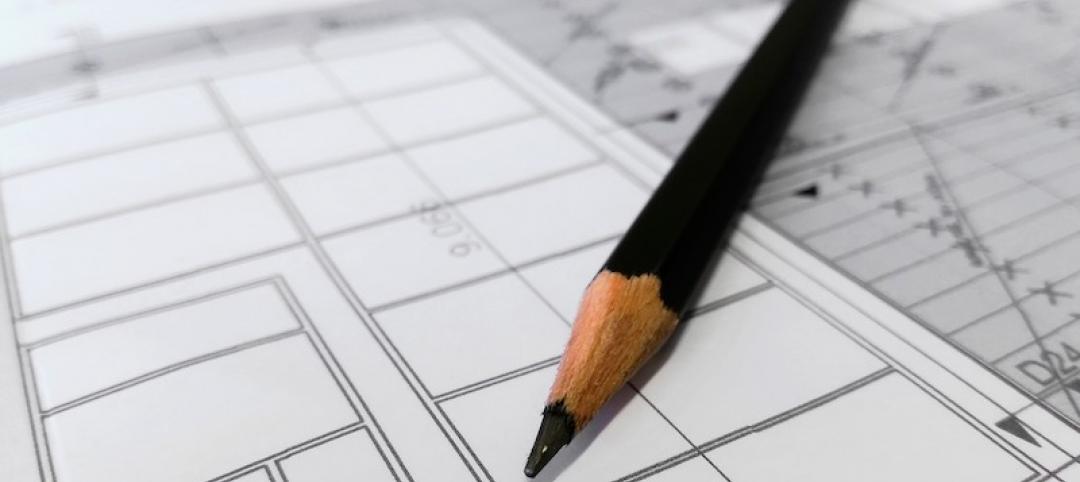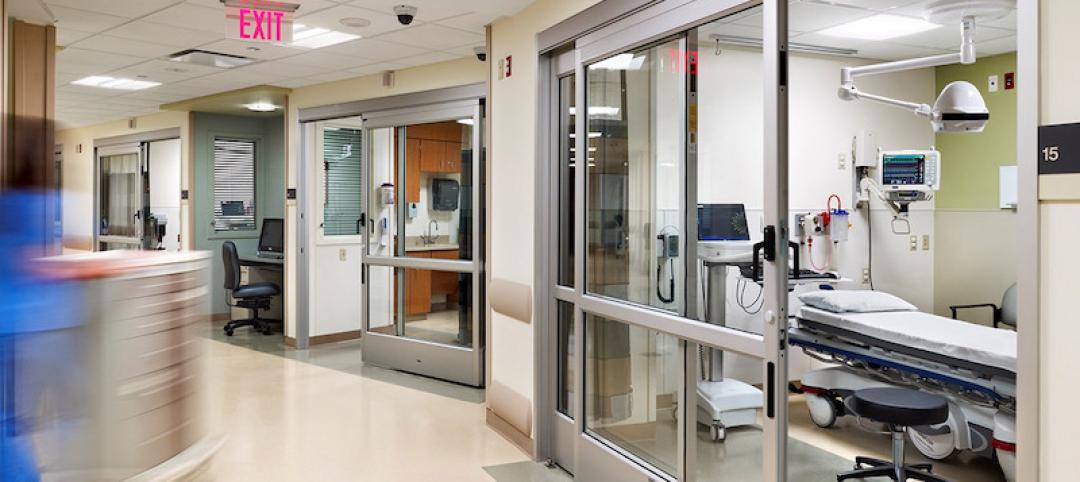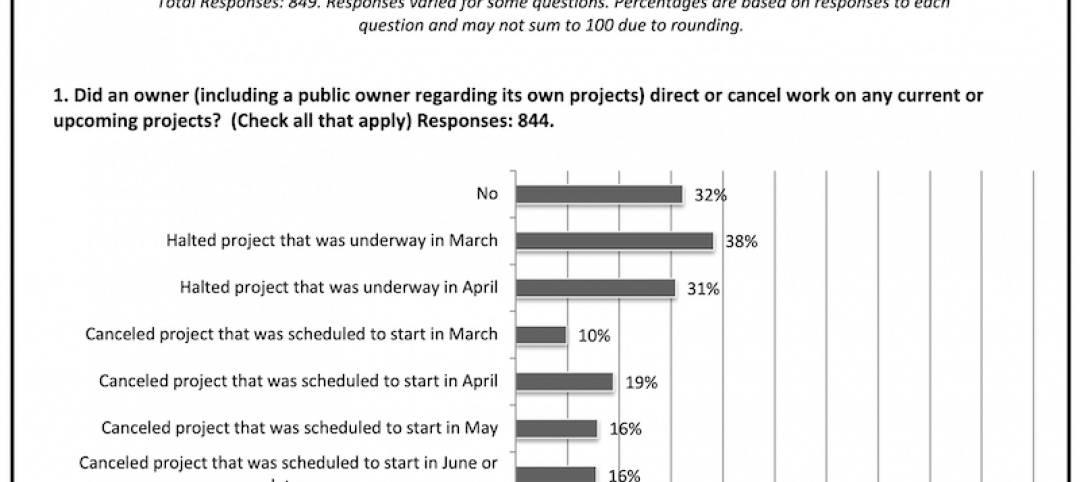In its prefabrication factory in Appleton, Wis., The Boldt Company, a national general contractor, is manufacturing modules for STAAT Mod, a prefab modular solution designed by HGA for assembling field hospitals capable of providing airborne infection isolation rooms.
STAAT is an acronym for Strategic Temporary Acuity-Adaptable Treatment. The isolation rooms are designed with enough clearance for safe bed transfers, and can accommodate equipment and a reclining chair. The system, which is expandable, includes flexible support spaces, three-bay negative pressure units, an intake module, equipment room and staff work area, clean utility and medication/nourishment spaces, staff lounges and private work areas, and the electrical/mechanical infrastructure needed for operations.
Boldt currently has seven modules in various stages of production for an unnamed customer on the East Coast. (It declined to make public that customer’s name because the contract hadn’t been finalized at presstime.)
The building team on this project includes the mechanical contractor Tweet/Garot, the electrical engineer Faith Technologies, and the medical equipment planning firm IMEG. Information about STAAT Mod, and an animated video of how this system comes together, can be viewed and downloaded here.
Kurt Spiering, a healthcare market sector leader for HGA, notes that modularization has been A factor in the healthcare arena for the past six to eight years, partly because of the industry’s construction labor shortages. “It’s been in our blood for a while.” The challenge in developing STAAT Mod, he explains, was “maintaining the quality of care using different materials, and building something within three weeks.”
Boldt started exploring prefabrication for a 274-bed acute care hospital it built—in partnership with Herrero Builders— a few years ago for Sutter Health in San Francisco. The hospital sits on a one-block lot that had virtually no drop-off area available for materials. For that project, Boldt put up a temporary factory on Treasure Island, where it produced components like water closets and drinking fountain stations.
It then had a client in Chicago, Advocate Aurora Health, for which it produced a proof-of-concept modular master plan for healthcare clinics, medical office buildings, and ambulatory facilities. “We built the prototype in our Appleton factory, and drove it around the country” to test its durability, says Dave Kievet, Boldt’s COO.
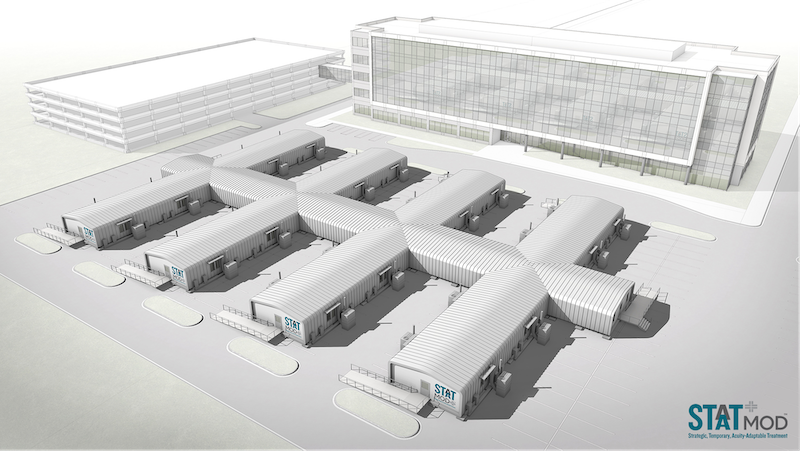
STAAT Mod is designed and engineered to be expandable to meet the community's needs.
Then, he says, “the coronavirus hit.” Boldt began contacting some of its long-standing design and building partners to figure out how to develop a modular system with negative pressurization. In that endeavor, Boldt consulted with Theda Care and Froedtert Hospital in Wisconsin.
The Boldt Company is one of the industry’s leading proponents of Integrated Lean Project Delivery to control costs, increase the speed of construction, and drive out waste. Kievet says that ILPD allowed the building team to design and develop STAAT Mod “very quickly.”
Spiering says that choices were made around two priorities: staff and patient safety, and getting good clinical outcomes. Jeff Harris, HGA’s director of engineering, adds that the building team took a “kit of parts” approach, which included choosing to use a standard 3- to 4-ton rooftop air handling unit that could service a couple of rooms that are designed with oversized ducts. The rooms that are negative pressurized draw air through HEPA filters.
Now that the U.S. Army Corps of Engineers is supervising the conversion of spaces like convention centers to alternate patient care facilities, HGA and Boldt views the states, which are coordinating these conversion efforts, as the primary buyers for STAAT Mod. Since it made public information about STAAT Mod, Boldt has had conversations with at least 20 potential customers, says Stacy Robben, the firm’s Vice President of Business Development.
Kievet estimates that once an order is placed, Boldt can get the first module up and operational within 14 to 17 days, and complete an entire order within 20 to 28 days. “The target is to get the completion down to 14 days,” he says. The price of the system will vary by the number of modules used. HGA|Boldt’s pricing sheet states that a two-room airborne isolation room would cost $335,000. A three-bed open bay negative pressure modular $317,000. So a two-tier system with 32 isolation rooms and all the other bells and whistles would run about $8.3 million.
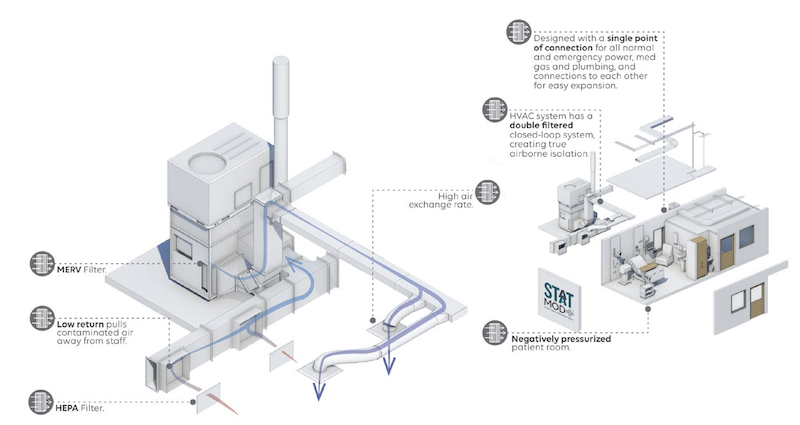
This illustration shows the system's air handling and filtration mechanics.
Boldt sees three different practical applications for STAAT Mod: as supplemental interior isolation rooms within an existing system of care; as a modular system that’s connected to an existing hospital’s infrastructure, built (theoretically) on that facility’s parking lot; and as a self-sufficient temporary hospital with infrastructure.
STAAT Mod could be used to treat a hospital’s most severe cases, freeing up hospital and clinic beds for procedures like elective surgeries, which is where many healthcare systems derive a substantial portion of their revenues. Kievet says it’s conceivable that modules could be disassembled and reassembled as needed, or built on foundations for more permanent use.
Boldt has formed alliances with several other prefabrication firms in different parts of the country, including Southland Industries, to expand its capacity to provide STAAT Mod systems across the U.S. Boldt has 14 offices in the U.S., and healthcare is one of nine industry sectors it serves.
Related Stories
Coronavirus | Mar 30, 2020
Your turn: Has COVID-19 spelled the death knell for open-plan offices?
COVID-19 has designers worrying if open-plan offices are safe for workers.
Coronavirus | Mar 30, 2020
Learning from covid-19: Campuses are poised to help students be happier
Overcoming isolation isn’t just about the technological face to face, it is about finding meaningful connection and “togetherness”.
Coronavirus | Mar 30, 2020
COVID-19 innovation: Setting parameters for hotel-to-hospital conversions
tvsdesign breaks down different room types and how they might help free up hospital beds for coronavirus patients.
Coronavirus | Mar 30, 2020
New Department of Homeland Security guidance clarifies construction's role in supporting essential critical infrastructure
Construction officials say new federal guidance should signal to state and local officials the need to allow construction activity to continue, or resume, during coronavirus-related work stoppages.
Coronavirus | Mar 27, 2020
Sharp jump in owners cancelling or delaying construction projects across the country, new survey finds
After 42 states added jobs in February, coronavirus is taking a swift and severe toll on the industry, prompting association officials to call for additional measures to help workers and firms recover.
Coronavirus | Mar 27, 2020
Covid-19 stalls demand for design services
Two thirds of architecture firms report slowing or stoppage of projects due to COVID-19.
Coronavirus | Mar 26, 2020
It’s not if, but when: Designing healthcare spaces that support pandemic response
What can we learn from Singapore’s response to COVID-19? How does it impact the next generation of hospitals?
Coronavirus | Mar 26, 2020
AIA praises Congress for advancing desperately needed COVID-19 relief
Approval for the latest relief legislation advances a number of AIA-supported measures to help meet the needs of firms and members.
Coronavirus | Mar 25, 2020
Coronavirus pandemic's impact on U.S. construction, notably the multifamily sector - 04-30-20 update
Coronavirus pandemic's impact on U.S. construction, notably the multifamily sector - 04-30-20 update
Coronavirus | Mar 25, 2020
Plaza Construction and Central Consulting & Contracting strategic alliance expands to Florida in response to coronavirus pandemic
New York City-based partnership to aid Florida healthcare systems amid COVID-19 outbreak and will continue medical construction in the region following resolution.


